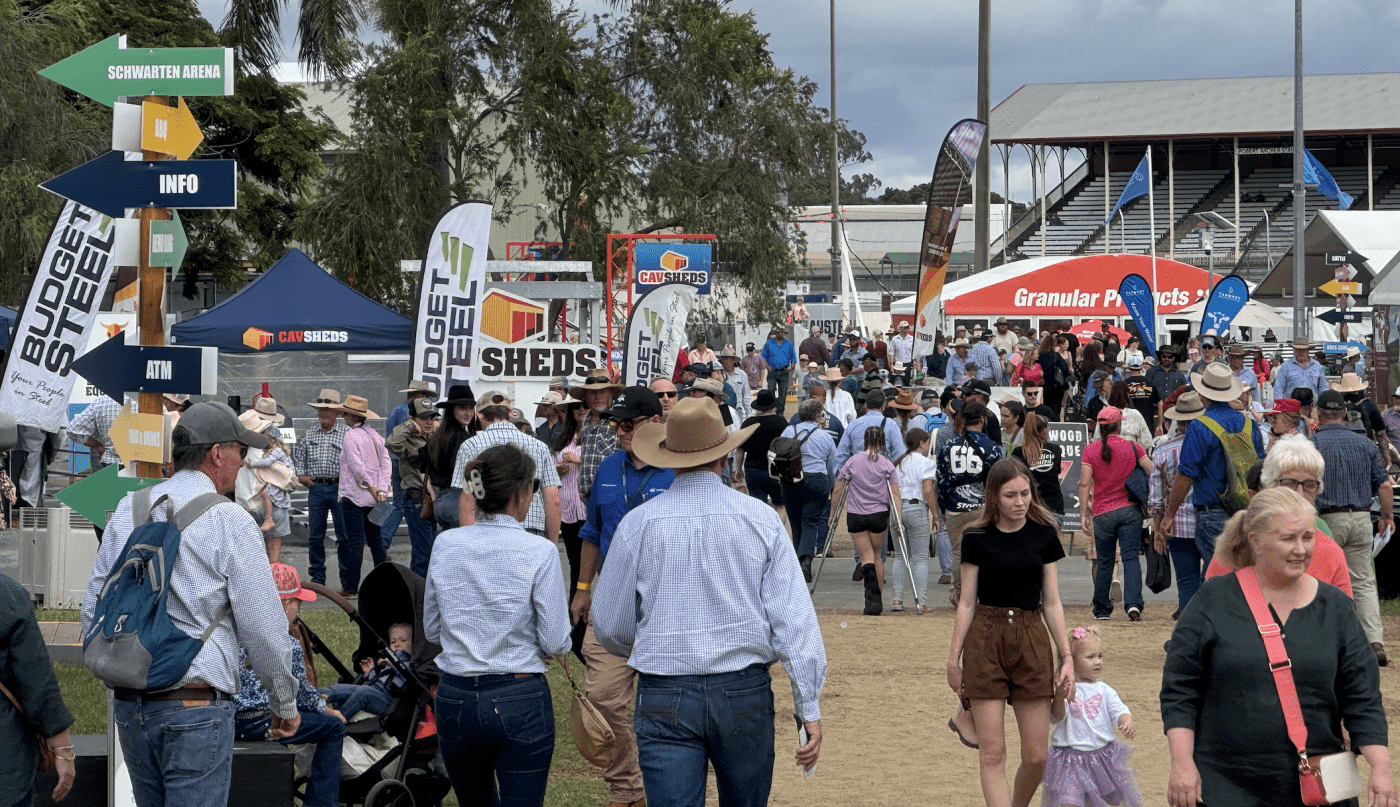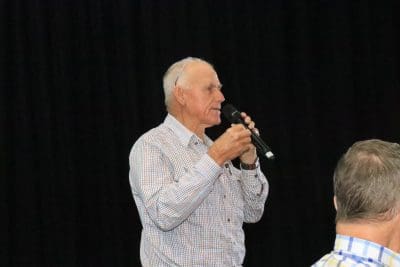The largest event in regional Australia broke straight into a gallop in Rockhampton this morning with huge crowds descending on the beef capital to assess the latest and greatest in genetics, technology, equipment, thought-leadership and brands the industry has to offer.
“It is an incredible event, fortunately it only happens once every three years, because it will take about 2.5 years to recover from,” Cattle Australia and AAM managing director Garry Edwards remarked in his opening comments to more than 600 people gathered for this morning’s Cattle Australia Symposium.
Related: Beef 2024 Weekly Grill Podcast Trendsetters series – Garry Edwards
Beef Australia expos have the power to reconnect old friends, connect new ones and to bridge enormous distances between beef producing countries all over the world.
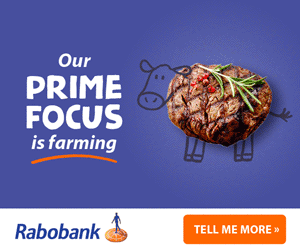 International visitors missed out on Beef 2021 due to COVID, and this year more than 600 have travelled from all corners of the world, relishing the chance to meet and compare notes with cattle producers from every state and Territory of Australia.
International visitors missed out on Beef 2021 due to COVID, and this year more than 600 have travelled from all corners of the world, relishing the chance to meet and compare notes with cattle producers from every state and Territory of Australia.
Among the international visitors present is US National Cattlemen’s Beef Association president Mark Eisele, who will address the Rural Press Club of Queensland breakfast and a Cattle Australia seminar on Thursday, and Irish farm leader and agricultural carbon expert John Gilliland, who will speak at a Woolworths breakfast tomorrow morning.
Included in the overseas delegates in Rocky this week is a large group of Vietnamese live cattle and genetics importers, beef importers, butchers, retailers and distributors and Government officials, and representatives from Government and universities in Fiji, Papua New Guinea, Solomon Islands, Timor Leste, Tonga and Vanuatu being led by CQUniversity livestock researchers Simon Quigley and Amy Bates.
Industry locked in a fight for its future
Beef 2024 is a celebration of the Australian beef and cattle industry, but also plays an important role in connecting producers with speakers well-versed in how the industry is viewed by consumers, Governments and interest groups on the national and global stage.
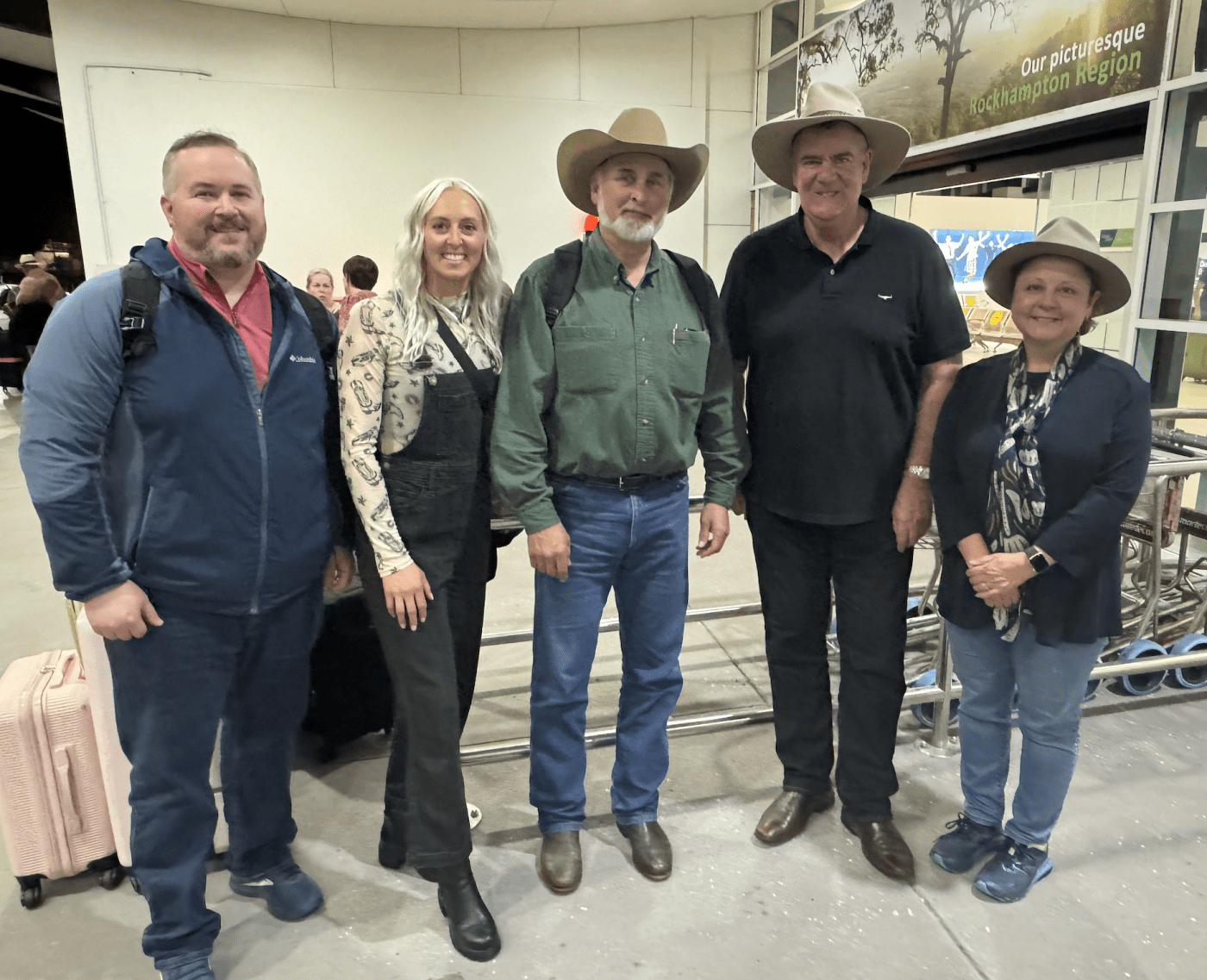
One of the many ways Beef Australia finds ways to connect people: A chance meeting at the Rockhampton airport last night where the President of the US National Cattlemen’s Beef Association Mark Eisele, travelling to Beef 2024 with his daughter Kaycee and NCBA executive direct Kent Bacus (left), met Christine Elder (right), US Consul General of the US Consulate General in Sydney, responsible for representing the United States in New South Wales and Queensland, who was also arriving in Rockhampton as a guest of the Queensland Government and Queensland Minister for Agriculture Mark Furner.
There was no sugar-coating this morning a recurring theme that the global beef industry is locked in a fight for its future, and may not be doing enough to win the trust of busy, middle-ground consumers who are vital to its future but remain uncertain if everything they hear from the loud voices opposing the livestock sector are true.
Shoot where the ducks are: Ex NZ PM
Former New Zealand Prime Minister Sir John Key – after entertaining the crowd with a timeless story about tuna fishing on official duty while taking a call from then British PM David Cameron – advised the industry not to waste time trying to win over industry opponents whose minds were already made up.
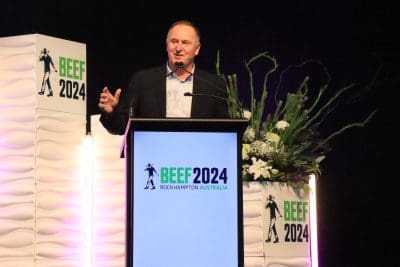 Rather, he suggested the industry “shoot where the ducks are”.
Rather, he suggested the industry “shoot where the ducks are”.
“I’ll tell who your industry shouldn’t be talking to,” he said.
“Don’t go and talk to environmental NGOs, the Green party in Australia, or any teal candidate.
“You might think I’m nuts, but here is the reason.
“They will never change their mind, their minds are made up – ‘you are bad, you cause climate change’ – they will never change.
“I think for the beef industry in Australia your target isn’t the people who have made up their mind and will never change.
“Your target is actually the people who are the masses of Australia, who actually have a have a lot of common sense, and who understand the beef industry (provides) food self-sufficiency and understand that if we closed your industry down tomorrow it would be replaced with supply from other countries of the world who are far worse for the planet than you will ever be.”
He said the industry’s strategy should be “get out there and actually target the people who want to support your industry”.
He also suggested the industry “fight for fairness” when it comes to climate change.
“The argument isn’t about whether it is right or wrong, it is are you being asked to fight with one arm behind your back compared to someone in Europe and Brazil.
“Fight for a level playing field, that is your argument.
“You’re fighting them for them to understand what you are doing. Every country needs food security, and you have to fight for free market access, they are the things that really matter.”
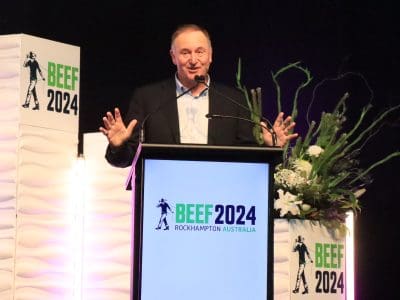 Sir John, who led NZ for eight years, and enjoyed the highest popularity rating of any political leader on record, provided some perspective from his own political career.
Sir John, who led NZ for eight years, and enjoyed the highest popularity rating of any political leader on record, provided some perspective from his own political career.
“We spoke to the NGOs, we spoke to the Greens, and I think we converted one in 100, maybe one in a thousand and I remember saying ‘We should shoot where the ducks are’,” he said.
“As soon as we changed our mindset, it changed our polling. For the beef industry, the target is not the people whose minds will never change, it’s middle Australia.
“Target the people who want to support you. Talk about why you’re good for the planet and be tough on yourselves. Nothing is going to turn off that group you’re trying to win more than animal welfare issues.”
Sir John said he was “massively optimistic” for the future of Australian and New Zealand agriculture, particularly given the projected growth in economic strength and per person beef consumption in countries such as Indonesia and China.
“As soon as you get wealthy, you buy protein and you buy it from a country you can trust – and that is Australia and New Zealand,” he said.
“Get uncomfortable”
Cattle Australia president Garry Edwards urged the industry to “get uncomfortable being uncomfortable having conversations with people you don’t know”.
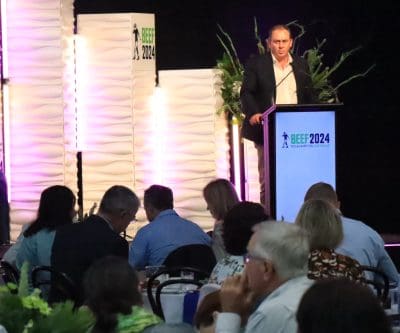 “You’ll hear this week about some challenges that our industry faces about explaining to our urban consumers and contemporaries and cousins both domestically and abroad about how we raise the amazing beef proteins that we produce in this country.
“You’ll hear this week about some challenges that our industry faces about explaining to our urban consumers and contemporaries and cousins both domestically and abroad about how we raise the amazing beef proteins that we produce in this country.
“Their concerns often come from confusion created by others or those seeking to gain from our hardship.
“My words to you are simple in this regard: Get uncomfortable being uncomfortable having conversations with people you don’t know.”
He said the industry did a “tremendous job of talking to ourselves”, but needed to embrace the challenge of talking to consumers of their products.
“Please speak to them, because ultimately that is what delivers our social license and our social license is critical to the prosperity and profitability of our sustainable future.”
No time to be humble
He also added that this was not the time for humility.
“Unfortunately being humble won’t help in this instance.
“And that is the tendency for the vast majority of people in our fantastic industry.
“We need to embrace the reality and proudly tell the story of the cyclical nature of carbon in our production system, and our world’s best practice in regards to animal welfare, and the efforts we take daily to improve and protect the vegetation on our properties and the forage production systems that the humble cow chews.
“She chews on a daily basis to convert human-indigestible plant material from the vast grasslands and rangelands we have in this country to the high quality red meat protein that we know simply as beef.
“That is something to be incredibly proud of and it is a story we need to communicate very, very clearly.”
‘Target the undecided’
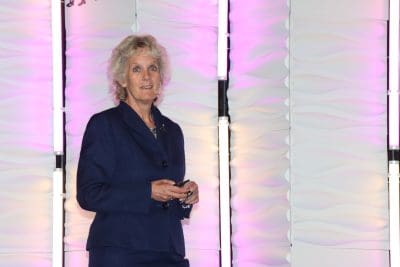 Animal geneticist and Professor of Cooperative Extension in the Department of Animal Science at the University of California, Davis, Dr Alison Van Eenennaam agreed in her speech that “the undecided” should be the target audience.
Animal geneticist and Professor of Cooperative Extension in the Department of Animal Science at the University of California, Davis, Dr Alison Van Eenennaam agreed in her speech that “the undecided” should be the target audience.
“We need to get out there and tell compelling narratives – especially farmers and agricultural scientists – alternative facts and untold tradeoffs have real environmental impacts.”
The world needs Australian beef
Ralph Schoellhammer, an economist and political theorist at Webster University Vienna and the Hungarian Think-Tank MCC Budapest, told the seminar that the world economy needs Australian agriculture.
“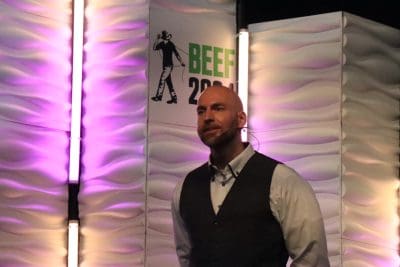 You are a much more important player than you get credit for. Australia is one of the largest beef exporters and one of the most important exporters of calories. Without Australia there would be famine.
You are a much more important player than you get credit for. Australia is one of the largest beef exporters and one of the most important exporters of calories. Without Australia there would be famine.
“Mining, agriculture and energy do not have an efficient lobby. In politics and economic outcomes, yes absolutely, they’re good at lobbying politicians.
“But in popular culture and in the public imagination, I’m always surprised when I’m in Australia you have these debates about drag queen story hour, or transgender issues in schools. The culture wars are on our minds all the time.
“I’m always wondering why is there never something like a coalminer’s story hour? Why don’t we have school children spending time on a farm?
“If people don’t know where their fundamental sources of wealth and prosperity come from, how are they supposed to defend them?”

